Savannah, GA Pollen and Allergy Report for Summer 2023
Pollen Allergy Trends in Savannah, GA
When is pollen lowest in Savannah, GA?

February
Lowest month total PPM
Avg. PPM
When is pollen highest in Savannah, GA?

April
Highest month total PPM
Avg. PPM
How does pollen in Savannah, GA compare to Georgia?
Savannah has a lower average PPM than the state of Georgia.
Savannah yearly avg PPM:
Georgia yearly avg PPM:
How does pollen in Savannah, GA compare to the USA?
Savannah has a higher average PPM than the USA.
Savannah yearly avg PPM:
USA yearly avg PPM:
Is pollen worse this year in Savannah, GA?
Spring 2023 was better than spring 2022.
Spring 2023 PPM:
Spring 2022 PPM:
Average PPM in Savannah, GA
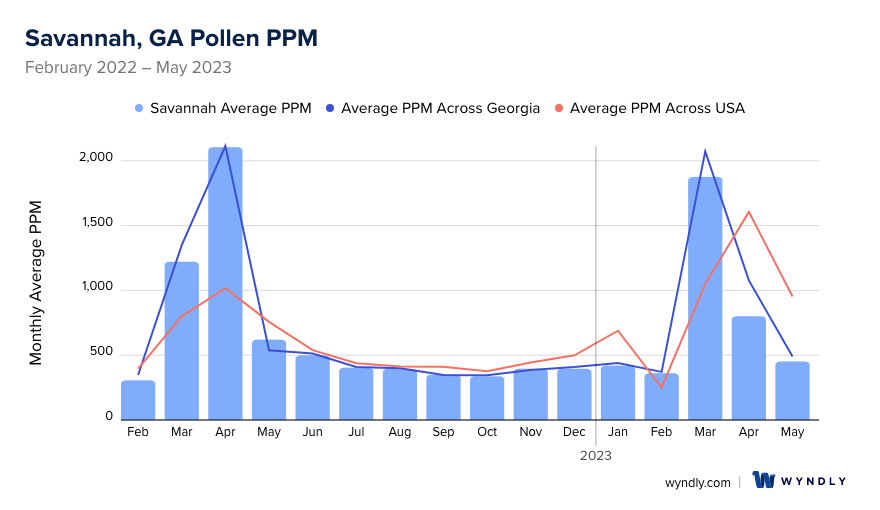
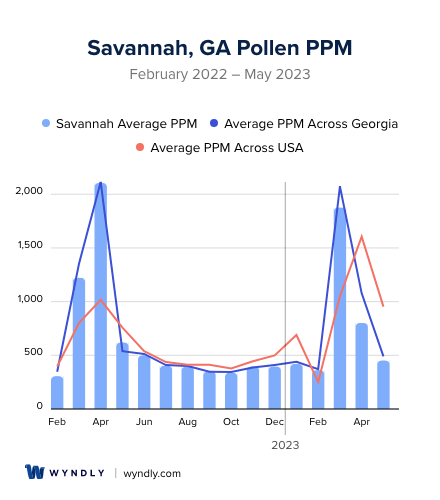
Savannah, GA Pollen and Allergy Breakdown by Month
Grass
When is grass pollen highest in Savannah, GA?
April has the highest grass pollen in Savannah, GA with an average PPM of
When is grass pollen lowest in Savannah, GA?
December has the lowest grass pollen in Savannah, GA with an average PPM of
Tree
When is tree pollen highest in Savannah, GA?
March has the highest tree pollen in Savannah, GA with an average PPM of
When is tree pollen lowest in Savannah, GA?
September has the lowest tree pollen in Savannah, GA with an average PPM of
Weed
When is weed pollen highest in Savannah, GA?
April has the highest weed pollen in Savannah, GA with an average PPM of
When is weed pollen lowest in Savannah, GA?
February has the lowest weed pollen in Savannah, GA with an average PPM of
Savannah, GA Pollen Monthly Breakdown by Pollen Type
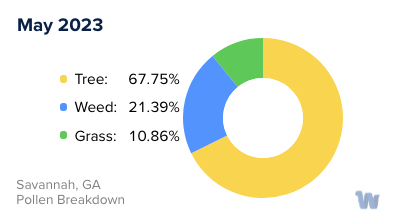
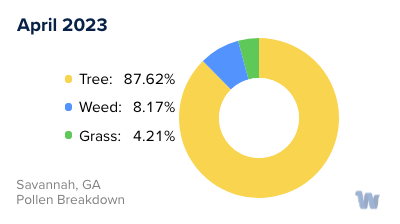
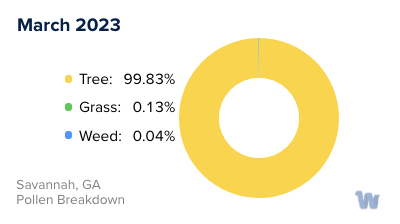
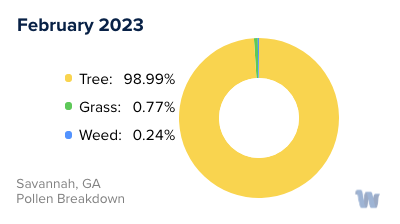
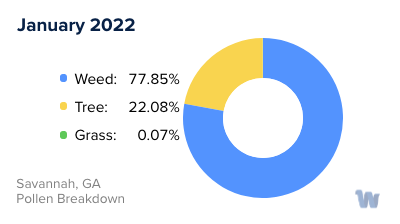
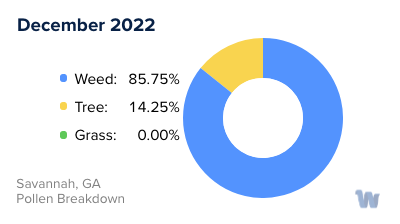
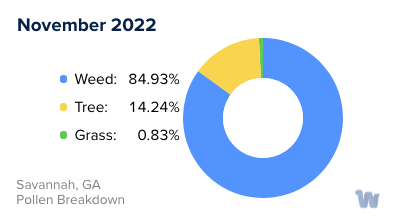
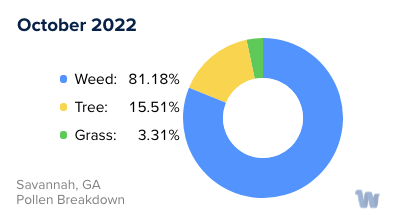
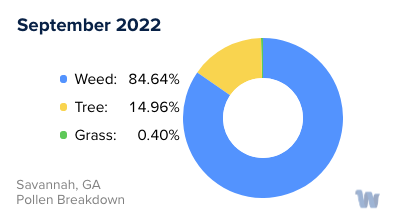
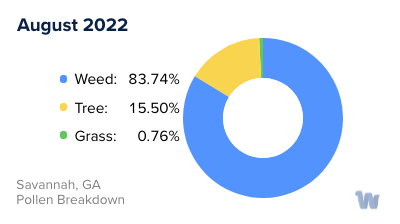
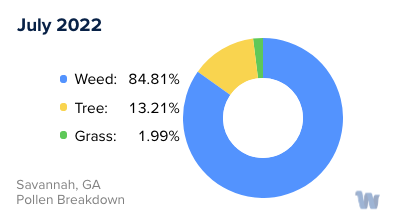
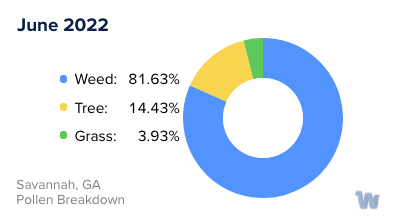
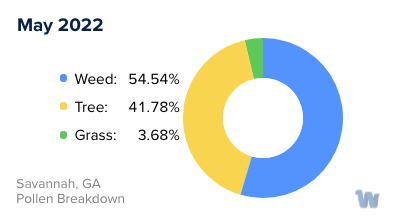
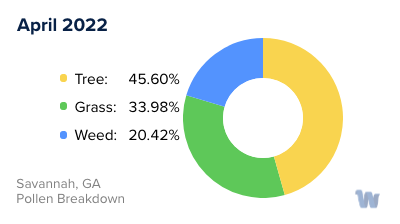
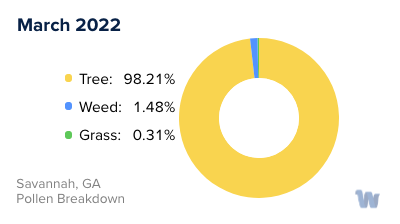
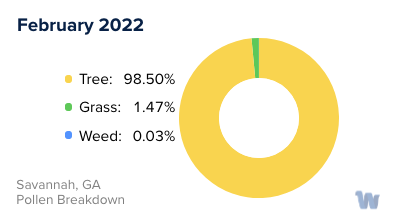
Pollen and Hay Fever in Savannah, GA
Pollen allergies, often known as hay fever, are a common concern for many residents of Savannah, Georgia. This picturesque city, with its sprawling parks and ornate architecture, is home to a diverse array of flora that can trigger these allergies. Understanding the types of pollen in the area and the seasons in which they peak can be crucial for those sensitive to these airborne allergens.
In Savannah, there are primarily three types of pollen to be aware of: tree, grass, and weed. Each type has its own distinct season, making the city a year-round challenge for allergy sufferers.
Tree pollen is the first to make its appearance each year. Beginning as early as late winter and extending into spring, trees such as oak, pine, and cedar release their pollen into the air. Savannah's iconic Southern live oaks are particularly prolific pollen producers.
As the tree pollen season starts to wind down, grass pollen takes the stage. From late spring into early summer, common grasses like Bermuda and Bahia, both prevalent in Savannah, begin to release their pollen. Savannah's lush lawns and golf courses can be a source of this type of pollen, which can be potent even in smaller quantities.
Finally, as summer fades into fall, weed pollen emerges. Ragweed, sagebrush, and lamb's quarters are among the culprits during this season. Even though these plants may not be as noticeable as the grand trees or verdant grasses, their pollen can be just as problematic.
Despite the challenges, living in Savannah doesn't have to be a constant battle with hay fever. By understanding the types of pollen and their seasons, residents can better anticipate and navigate the pollen seasons. While this piece does not delve into treatment options, awareness is the first step towards managing allergies effectively. Living in Savannah, with its rich history and natural beauty, is a delight that far outweighs the temporary inconvenience of pollen allergies.

